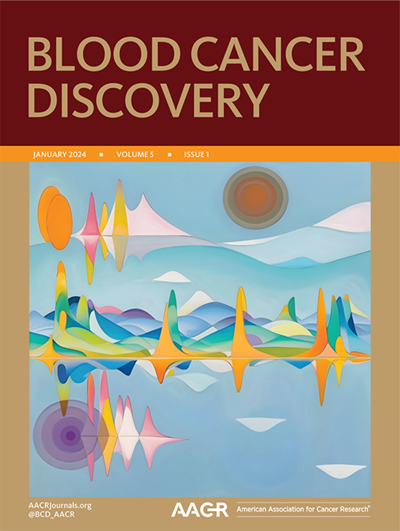预防与 T 细胞激活癌症疗法相关的免疫毒性的新策略。
IF 11.5
Q1 HEMATOLOGY
引用次数: 0
摘要
双特异性单克隆抗体和嵌合抗原受体T(CAR-T)细胞疗法的问世,使血液恶性肿瘤的新型治疗策略重点从化疗转向了免疫疗法。尽管双特异性抗体和CAR-T细胞具有良好的疗效,但它们也有独特的、可预测的副作用,即T细胞过度激活经常导致首剂后出现细胞因子释放综合征(CRS),有时还会在后续剂量后复发。在此,我们将讨论在这种情况下减轻 CRS 的新策略。本文章由计算机程序翻译,如有差异,请以英文原文为准。
Emerging Strategies for the Prevention of Immune Toxicities Associated with T cell-Engaging Cancer Therapies.
Summary: Immune-related toxicities including cytokine release syndrome (CRS) and immune effector cell-associated neurotoxicity syndrome (ICANS) are common side effects of bispecific antibody and chimeric antigen receptor (CAR) T-cell therapies of hematologic malignancies. As anti-inflammatory therapy (the standard of care) is variably effective in mitigating these toxicities after onset, here we discuss emerging evidence for shifting the strategy from mitigation to prevention.
求助全文
通过发布文献求助,成功后即可免费获取论文全文。
去求助
来源期刊

Blood Cancer Discovery
Multiple-
CiteScore
12.70
自引率
1.80%
发文量
139
期刊介绍:
The journal Blood Cancer Discovery publishes high-quality Research Articles and Briefs that focus on major advances in basic, translational, and clinical research of leukemia, lymphoma, myeloma, and associated diseases. The topics covered include molecular and cellular features of pathogenesis, therapy response and relapse, transcriptional circuits, stem cells, differentiation, microenvironment, metabolism, immunity, mutagenesis, and clonal evolution. These subjects are investigated in both animal disease models and high-dimensional clinical data landscapes.
The journal also welcomes submissions on new pharmacological, biological, and living cell therapies, as well as new diagnostic tools. They are interested in prognostic, diagnostic, and pharmacodynamic biomarkers, and computational and machine learning approaches to personalized medicine. The scope of submissions ranges from preclinical proof of concept to clinical trials and real-world evidence.
Blood Cancer Discovery serves as a forum for diverse ideas that shape future research directions in hematooncology. In addition to Research Articles and Briefs, the journal also publishes Reviews, Perspectives, and Commentaries on topics of broad interest in the field.
 求助内容:
求助内容: 应助结果提醒方式:
应助结果提醒方式:


